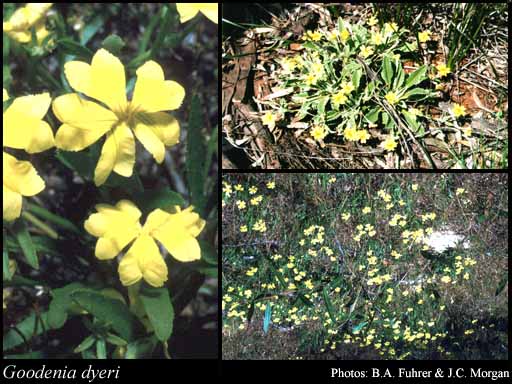- Reference
- Engl., Pflanzenr. 277(Heft 54):56 (1912)
- Conservation Code
- Not threatened
- Naturalised Status
- Native to Western Australia
- Name Status
- Current
Ascending herb, 0.02-0.2 m high. Fl. yellow, Aug to Nov. Loam. Undulating plains.

Scientific Description
Stems unribbed. Leaves flat, 20-40 mm long, 7-20 mm wide, Indumentum present, with sparse, stellate hairs; margins entire. Bracteoles present, 3.5-4 mm long, hairy, with simple hairs. Pedicel pedicellate, Pedicel length the pedicels 3-12 mm long, Indumentum present, Hair type with simple hairs. Calyx lobes present, Calyx length 4-8 mm long, hairy, with dense or sparse, simple hairs. Corolla yellow, 16-20 mm long, without auricles, not spurred, hairy on the outside, with sparse, simple hairs, glabrous on the inside; central lobes 7-9 mm long, with wings; outer lobes 7.5-9.7 mm long, wings present on both sides, 2-3.5 mm wide. Anthers free. Ovary inferior, not gibbose; style 6-7 mm long, hairy; indusium single, hairy; ovules more than two. Flowers in August, September, October and November. Occurs in the Coolgardie (COO) and Avon Wheatbelt (AW) IBRA Region(s), of the Eremaean (E) and South West (SW) Botanical Province.
Distribution
- IBRA Regions
- Avon Wheatbelt, Coolgardie, Mallee.
- IBRA Subregions
- Eastern Goldfield, Merredin, Southern Cross, Western Mallee.
- Local Government Areas (LGAs)
- Dundas, Kalgoorlie-Boulder, Kondinin, Merredin, Narembeen, Wyalkatchem, Yilgarn.